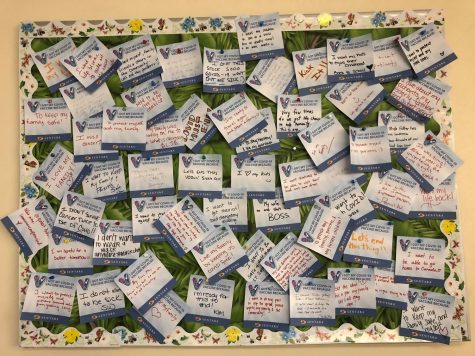COVID-19 has impacted us far beyond the disease itself
COVID related lifestyle changes have long lasting positive and negative impacts
October 13, 2021
Since March of 2020, day-to-day life has changed. For students, this change meant extended periods of time away from friends and classmates. Learning from home last year left long lasting positive and negative impacts. Some students took the opportunity to relax and focus on self-care, while it left others felt isolated and alone.
“For me, the pandemic [and virtual learning] made my schedule more flexible,” said senior Ethan Rabusko. “Also, I felt more at peace with myself.”
Teenagers and adults have reported that the extra time alone during 2020 and 2021 gave them the opportunity to start new hobbies and discover new things about themselves. According to a study of 2,000 Americans by OnePoll, 70% reported they learned more about themselves during this time, and 55% were “a bit embarrassed by some of the things they valued pre-quarantine.”
“I found a sense of self sufficiency,” said sophomore Ian Hughes. ”Quarantine was hard at first, and not being able to really see people meant that I had to learn how to deal with my own problems more.”
Staying home also provided quiet time for creativity.

“Staying at home a lot has changed the way I look at fashion,” said senior Nevaeh Thorpe. “I´ve learned lots of new things about clothes that I never knew would benefit me and my fashion sense in the long run.”
Not everyone was expanding their self-sufficiency and creativity. Being isolated from others can take a toll.
“I honestly missed school,” said senior Sebastian Reynolds. “It was hard not being able to see my friends or any of my teachers in person.”
According to WebMD, researchers found that “46% of 977 parents of teens said their child has shown signs of new or worsening mental health conditions since the start of the pandemic.” This decline in mental health has not disappeared as we’ve started our “new normal.”
Mott pediatrician Dr. Gary Freed notes in the WedMD article that “just as young people are at the age of being biologically primed to seek independence from their families, COVID-19 precautions have kept them at home.”
According to the Centers for Disease Control the best ways to combat stress related to COVID stress is to: Take breaks from watching, reading, or listening to news stories, including those on social media; take care of your body (consider meditation, breathing exercises, or stretching); eat healthy; exercise regularly; get plenty of sleep; make time to unwind and time to connect with others.
If you or someone you know is suffering from COVID or quarantine related mental health concerns please make an appointment with your guidance counselor right away.
Despite all of the hard times this past year and a half has put us all through, we will use these newfound skills and knowledge to further discover ourselves and grow as people.

